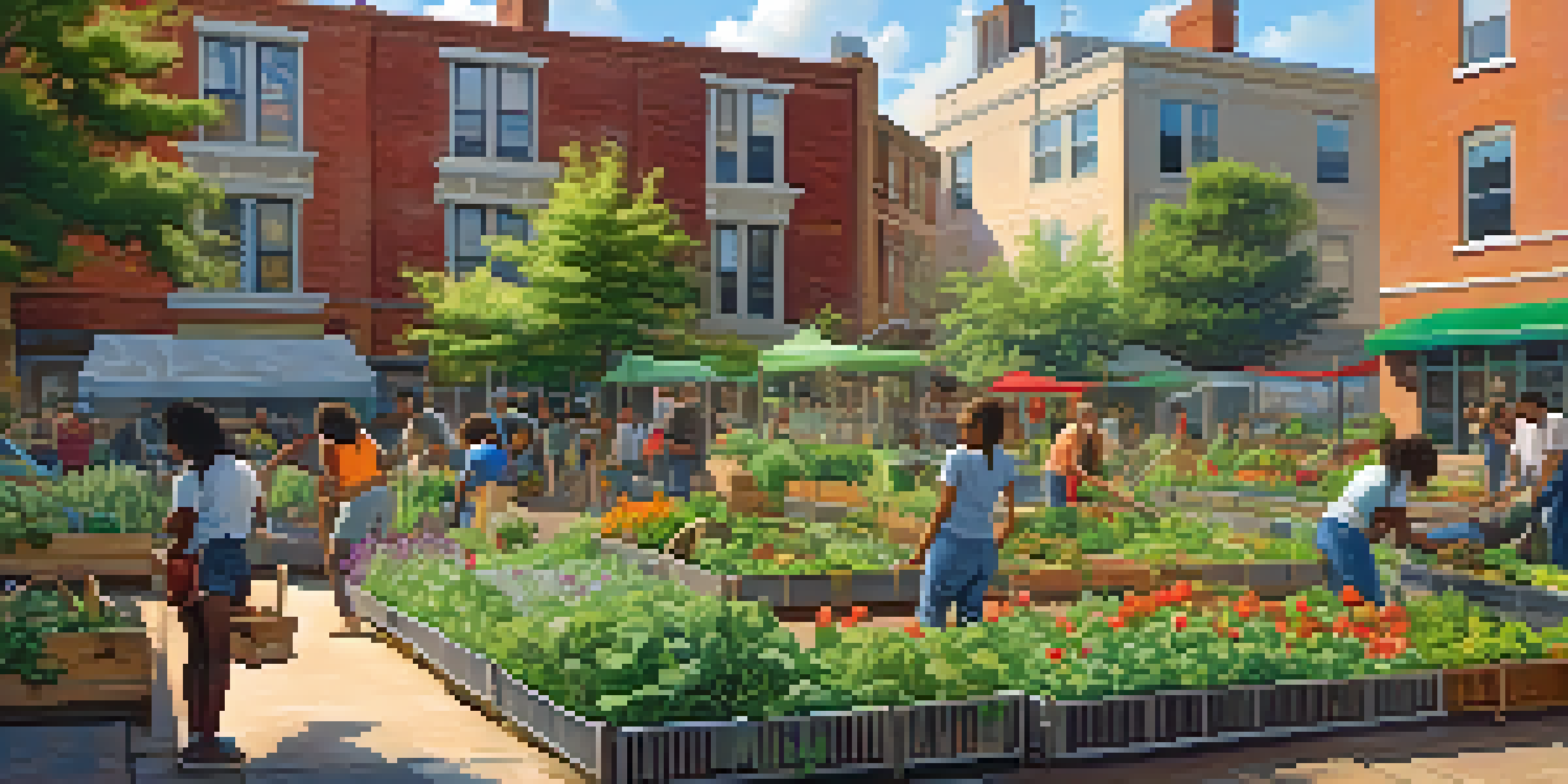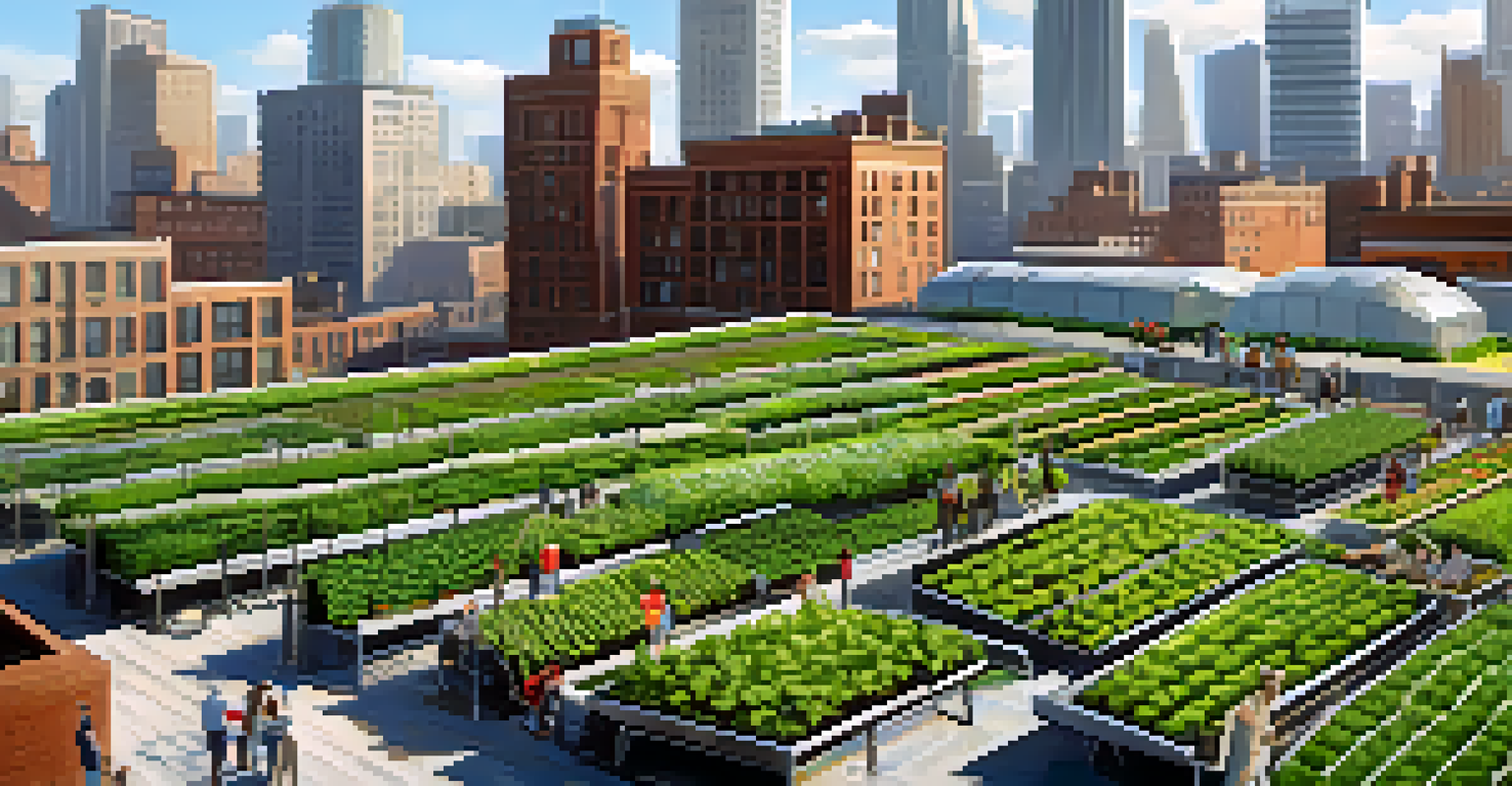Urban Agriculture and Its Effect on Community Engagement

What is Urban Agriculture and Why It Matters
Urban agriculture refers to the practice of growing food in urban areas, which can include gardens, farms, and even vertical farms. This movement is gaining traction as cities look for sustainable solutions to food security. Beyond just food production, urban agriculture embodies a proactive approach to utilizing available space for community benefit.
Urban agriculture is the ultimate expression of sustainability, and it transforms the way we look at food and community.
By transforming vacant lots and underutilized spaces into productive gardens, urban agriculture not only beautifies neighborhoods but also provides fresh produce that might otherwise be inaccessible. This accessibility is crucial in areas classified as food deserts, where residents have limited access to affordable and nutritious food.
Moreover, urban agriculture encourages a shift in how we view our cities and their potential. Rather than just concrete jungles, urban areas can become vibrant ecosystems that support both people and nature, leading to healthier communities overall.
The Role of Community Gardens in Urban Areas
Community gardens serve as a cornerstone of urban agriculture, acting as shared spaces for growing food, exchanging knowledge, and fostering social connections. These gardens often bring together people from diverse backgrounds, creating a sense of belonging and shared purpose. Imagine a local neighborhood where everyone contributes to a communal vegetable patch; it not only yields food but also friendships.

Participating in a community garden can empower residents by giving them a direct role in their food systems. This hands-on involvement cultivates skills, from gardening techniques to understanding seasonal cycles, which can lead to increased self-sufficiency. When people grow their own food, they develop a deeper appreciation for what goes into their meals.
Urban Agriculture Enhances Food Access
Urban agriculture transforms vacant spaces into productive gardens, providing fresh produce in food deserts.
Moreover, community gardens can serve as educational platforms, especially for children and families. Workshops about nutrition, sustainability, and gardening practices can be organized, helping to instill values of environmental stewardship and healthy living from a young age.
Enhancing Social Connections Through Urban Farming
Urban agriculture is more than just growing food; it fosters a sense of community by bringing people together. As neighbors collaborate on gardening projects, they develop relationships that transcend cultural and socioeconomic barriers. This interaction creates a network of support that can strengthen the fabric of the community.
The best part about gardening is that you never stop learning. There’s always something new to discover, and the community is there to share it with you.
Events such as harvest festivals, potlucks, or garden tours further enhance these connections. These gatherings not only celebrate the fruits of their labor but also encourage dialogue and collaboration among residents. Such interactions can lead to long-lasting friendships and a supportive community atmosphere.
Additionally, urban farming initiatives often invite local artists and musicians to showcase their talents, turning these spaces into cultural hubs. By combining agriculture with arts and community events, urban farms can become vibrant centers of engagement that enrich the lives of residents.
Promoting Sustainability and Environmental Awareness
Urban agriculture plays a vital role in promoting sustainability within city environments. By growing food locally, we reduce the carbon footprint associated with transporting food from rural areas to urban centers. This not only benefits the environment but also supports local economies, as residents can buy fresh produce directly from their neighbors.
Moreover, these initiatives often emphasize organic practices and eco-friendly gardening techniques. Community members learn about composting, permaculture, and natural pest control, fostering a culture of sustainability that extends beyond the garden. This knowledge can empower individuals to adopt more sustainable practices in their everyday lives.
Community Gardens Foster Connections
Community gardens create shared spaces that promote social ties and empower residents through involvement in food systems.
By connecting urban agriculture with environmental education, communities can cultivate a sense of stewardship for their surroundings. As residents become more aware of their ecological impact, they are likely to advocate for policies that promote green spaces and sustainable urban planning.
Economic Benefits of Urban Agriculture
Urban agriculture can have significant economic benefits for communities. By creating local food systems, cities can stimulate job creation, from farming roles to positions in food processing and distribution. This local focus not only boosts the economy but also keeps financial resources within the community.
Moreover, urban farms often attract customers who are willing to pay a premium for locally grown, fresh produce. This can lead to the establishment of farmers' markets or pop-up stands, providing additional revenue streams for local growers. It’s a win-win situation: consumers get fresh food, while farmers gain a sustainable income.
Additionally, urban agriculture can inspire entrepreneurial ventures. Individuals may start small businesses related to gardening supplies, cooking classes, or even urban farming consulting, fostering a culture of innovation within the community.
Health Benefits of Engaging with Urban Agriculture
Engaging with urban agriculture offers numerous health benefits, both physical and mental. Growing your own food encourages healthier eating habits, as homegrown produce is often more nutrient-rich than store-bought options. Fresh fruits and vegetables can significantly contribute to overall wellness and reduce the risk of chronic diseases.
In addition to physical health, gardening has been shown to have therapeutic effects on mental well-being. The act of nurturing plants can be a form of mindfulness, reducing stress and anxiety levels. Many people find that spending time in nature or engaging in hands-on activities like gardening helps them to unwind and reconnect with themselves.
Sustainability Through Local Practices
Urban farming supports sustainability by reducing carbon footprints and encouraging eco-friendly gardening techniques.
Furthermore, participating in community gardening can foster social ties, which are crucial for mental health. Building relationships with fellow gardeners can create a sense of belonging and shared purpose, leading to greater life satisfaction and emotional resilience.
Challenges Faced by Urban Agriculture Initiatives
While urban agriculture holds immense potential, it is not without its challenges. Issues such as limited access to land, zoning regulations, and financial constraints can hinder the growth of urban farms. Many aspiring gardeners may find it difficult to secure a suitable space for their initiatives, especially in densely populated areas.
Additionally, there can be a lack of community awareness or interest in urban agriculture. To overcome this, outreach and education are essential. Engaging with local organizations, schools, and community centers can help to raise awareness about the benefits of urban farming and encourage participation.

Lastly, sustainability is a continuous challenge. Urban farms must navigate fluctuations in weather, pests, and soil quality, requiring ongoing education and adaptation. By sharing resources and knowledge, communities can collaboratively address these challenges and create resilient urban agriculture systems.
The Future of Urban Agriculture and Community Engagement
The future of urban agriculture looks promising, with growing interest from both local governments and community members. As cities become more aware of the benefits of green spaces, we can expect to see increased investments in urban farming initiatives. This could result in the development of more community gardens, rooftop farms, and educational programs.
Moreover, technology is likely to play a significant role in the evolution of urban agriculture. Innovations such as hydroponics and aquaponics can make food production more efficient and accessible. By incorporating technology, urban farmers can maximize their output while minimizing environmental impact.
Ultimately, urban agriculture can be a catalyst for deeper community engagement and social change. By nurturing relationships, promoting sustainability, and fostering a sense of ownership, urban farming can transform neighborhoods into thriving, interconnected ecosystems that benefit all residents.